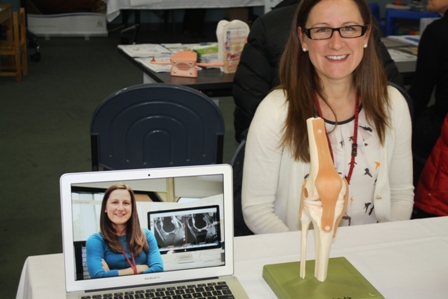Menzies researchers shine light on footballers’ knees

Menzies researchers shine light on footballers’ knees
The prevalence of knee injuries among Australian Rules footballers has prompted researchers at the Menzies Institute for Medical Research at the University of Tasmania to take a closer look at structural changes taking place in the knees of active players.
The prevalence of knee injuries among Australian Rules footballers has prompted researchers at the Menzies Institute for Medical Research at the University of Tasmania to take a closer look at structural changes taking place in the knees of active players.
Despite the frequency of injury, very little is known about the clinical relevance of knee changes in athletes, although there is evidence suggesting that some knee changes commonly seen in osteoarthritis may also be present in athletes.
Osteoarthritis expert Dr Dawn Aitken (pictured), a Senior Research Fellow at Menzies, performed knee MRI scans on a group of Australian Rules footballers playing in the Tasmanian State Football League during the 2014 season.
The scans showed that knee changes were common (67% had a bone lesion, 16% had meniscal damage, 43% had cartilage changes and 67% had inflammation). These changes appeared to be clinically important because they were linked with pain, dysfunction and past knee injury and surgery. During the course of the season, players who reported a new injury were more likely to develop bone lesions, cartilage changes and meniscal damage.
"While many players had knee changes resembling what is seen in osteoarthritis, at this stage, it is unclear whether they constitute an acute injury response - they may present a stress response to heavy loading and be 'normal' in this population. We are still unsure of their implication for long-term knee health and we now need to gain a better understanding of what happens to the knee changes over time in these players."
The study reiterates the importance of knee injury prevention. The researchers hope that gaining a better understanding of knee health in athletes will help to develop more effective prevention, treatment and rehabilitation strategies for acute knee injury, which may have the potential to prevent the subsequent development of osteoarthritis in the future.
"What we would really like to do next is follow players over a longer timeframe and see if their knee changes do contribute to the future risk of developing osteoarthritis and whether it is possible to intervene early to prevent this from happening," Dr Aitken said.
The research was presented at the Australian Rheumatology Association conference in Adelaide at the weekend.
Information released by:
Miranda Harman
Marketing and Communications Manager
Menzies Institute for Medical Research
University of Tasmania
Phone: 61 3 6226-7751
61 427 199 562
Email: miranda.harman@utas.edu.au
Contact:
Phone:
Email: